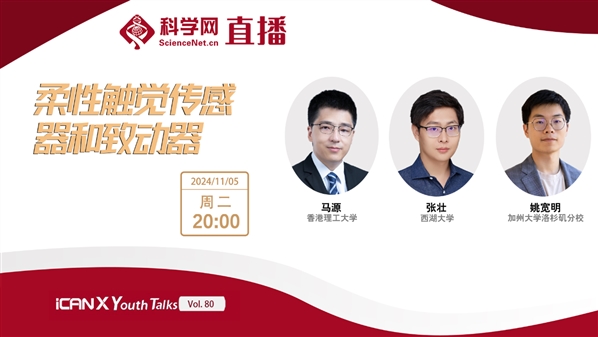|
|
|
|
|
香港理工大学、西湖大学等三位专家主旨报告讲述柔性触觉传感器和致动器 |
|
|

直播时间:2024年11月5日(周二)20:00-22:00
直播平台:

科学网APP
https://weibo.com/l/wblive/p/show/1022:2321325097380562469181
(科学网微博直播间链接)

科学网微博

科学网视频号
【直播简介】
北京时间11月5日晚八点,iCANX Youth Talks第八十期将隆重开播!本期,我们邀请到了香港理工大学助理教授马源、西湖大学助理研究员张壮、加州大学洛杉矶分校博士后研究员姚宽明担任主讲嘉宾,江苏大学副教授陈思,澳门大学助理教授钟俊文担任研讨嘉宾,北京航空航天大学教授王党校担任主持人,期待你一起加入这场知识盛宴。
【嘉宾介绍】

马源
香港理工大学
先进人机交互界面的开发
【ABSTRACT】
Over the last several decades, human-machine interactions have been limited to vision and audio channels. The introduction of haptics technologies has enabled users to receive mechanical feedbacks in the form of virtual touch. While the rapidly advancing haptics technologies in wearable devices and surface haptic devices have enabled many exciting applications in virtual reality (VR), augmented reality (AR), telecommunication, and teleoperation, they still suffer from issues in bulkiness, comfortability, and consistency. The solutions to these issues lie in the fundamental understanding of the multi-physics interactions in the human-machine interface, which include contact deformation, capillary formation, electric field, heat transfer, material non-linearity, and their complicated coupling effects. In this talk, Dr. Ma will discuss models on the multi-physics interactions in human-machine interface, with a special emphasis on modeling the finger friction variation on textured surfaces. This talk will also include how the multi-physics models have been applied in developing new wearable sensors, actuators, and surface haptics devices. The discussed models lay the foundation to develop haptics artificial materials (metamaterials) that can deliver any desired haptics performances for the next generation of human-machine mechanical interfaces and Metaverse.
在过去的几十年中,人机交互一直局限于视觉和音频通道。引入触觉技术使用户能够以虚拟触感的形式接收机械反馈。虽然可穿戴设备和表面触觉设备中快速发展的触觉技术已经在虚拟现实(VR)、增强现实(AR)、远程通信和远程操作等领域实现了许多令人兴奋的应用,但它们仍然存在着笨重、舒适性差和一致性不足等问题。这些问题的解决方案在于对人机界面中多物理学相互作用的基本理解,包括接触变形、毛细管形成、电场、热传递、材料非线性以及它们复杂的耦合效应。本报告将讨论人机界面中的多物理学相互作用模型,特别强调对纹理表面上手指摩擦变化建模。此次演讲还将包括多物理学模型在开发新的可穿戴传感器、执行器和表面触觉设备方面的应用。所讨论的模型为开发触觉人机机械界面的下一代可以提供任何所需触觉性能的触觉人工材料(超材料)奠定了基础。
【BIOGRAPHY】
Dr. Yuan Ma received his bachelor’s and M.S. degrees in mechanical engineering and materials science from Tsinghua University, Beijing in 2011 and 2013, respectively. He received his Ph.D. degree in mechanical engineering from the University of California, Berkeley in 2018. He is currently an Assistant Professor at the Hong Kong Polytechnic University. His research interest includes micro/nano scale mechanical and tribological behavior of human-machine interfaces, haptics metamaterials development, wearable devices with piezoelectret materials, and application of artificial intelligence in human-machine interactions. He has authored 12 peer-reviewed journal papers in Science Robotics, Advanced Materials, ACS Nano, Advanced Functional Materials, ACS Applied Materials and Interfaces, Applied Physics Letters, IEEE Transaction on Haptics, and IEEE Transaction on Magnetics.
马源博士,香港理工大学机械工程系助理教授。分别于2011年和2013年在清华大学获得机械工程和材料科学学士和硕士学位,并于2018年在加州大学伯克利分校获得机械工程博士学位。研究兴趣包括人机界面的微/纳尺度机械和摩擦行为、触觉超材料的开发、具有压电电荷材料的可穿戴设备以及人机交互中人工智能的应用。马源博士在Science Robotics、Advanced Materials、ACS Nano、Advanced Functional Materials、ACS Applied Materials and Interfaces等国际知名期刊上发表了多篇学术论文。

张壮
西湖大学
基于折纸结构的多模式柔性驱动与高保真触感交互
【ABSTRACT】
Unlike conventional rigid robots, soft robots have gained significant attention in the robotics community due to their excellent human-robot interaction capabilities. However, achieving similar levels of multimodal, high-performance motion as rigid robots while maintaining the structural compliance of soft robots remains a huge challenge, which is also one of the key limitations preventing soft robots from industrial applications. In this talk, I will introduce design approaches for multimodal soft actuation from three perspectives: how to realize multiple motion modes and high output force with conventional pneumatic methods, how to achieve high positioning accuracy and stiffness tuning through antagonistic actuation, and how to leverage innovative origami structures to enable all-purpose motion modes. Finally, I will discuss the potential of combining origami structures and multimodal soft actuation to enrich haptic interactions in both the virtual world and the physical world, aiming to open new technical pathways in the field of human-robot interaction.
不同于传统刚性机器人,柔性机器人因其优异的人机交互友好性成为了国际机器人学界的热点方向。但如何使柔性机器人在发挥其结构顺应性的同时,兼具如同刚性机器人般的多模态、高性能运动能力,是当前学界与业界的难题,也是制约柔性机器人走向工业应用的核心“硬伤”之一。在本次报告中,我将从三个方面展开介绍多模式柔性驱动的设计方法,包括如何使用传统气动方法实现多运动模式集成并提升输出力,如何利用拮抗驱动作用实现高精度运动输出与刚度调控,以及如何创新设计折纸结构以进一步实现全运动模式输出。最后,我将分别就利用折纸结构与多模式柔性驱动丰富虚拟世界与现实物理世界的新型触感交互展开讨论,旨在为人机交互领域开拓新的研究方向与技术路线。
【BIOGRAPHY】
Dr. Zhuang Zhang, Postdoctoral Fellow at Westlake University, received his Ph.D. in Mechanical Engineering from Shanghai Jiao Tong University in 2021. His research interests include flexible and soft-rigid hybrid actuators, origami robots, and multimodal haptics. In the past three years, he has published over 10 papers as the first or corresponding author in leading journals and conferences such as Nature Machine Intelligence, Nature Communications, Science Advances, and IEEE Transactions on Robotics. He serves as an associate editor and young editorial board member for journals and conferences including ICRA, Cyborg and Bionic Systems, and Soft Science. Dr. Zhang has been recognized with prestigious awards such as the China Top 10 Cutting-Edge Sci-Tech Talents – Innovation Contribution Award, the IROS New Generation Star, and the Outstanding Postdoctoral Fellow at Westlake University.
张壮,西湖大学博士后,助理研究员。2021年于上海交通大学获机械工程博士学位。研究方向包括柔性与刚柔耦合驱动器、折纸机器人、多模式触感交互等。近三年以第一/通讯作者于Nature Machine Intelligence, Nature Communications, Science Advances, IEEE Transactions on Robotics等国际权威期刊及会议发表论文10余篇,担任ICRA, Cyborg and Bionic Systems, Soft Science等期刊与顶会的副编及青年编委。曾获中国十大新锐科技人物创新贡献奖、IROS New Generation Star、西湖大学优秀博士后等荣誉奖项。

姚宽明
加州大学洛杉矶分校
全集成可穿戴电触觉界面与个性化虚拟触觉进展
【ABSTRACT】
The haptic interface enhances tactile perception for users in VR/AR, gaming, social media, and robotics. Conventional haptic interfaces are often bulky, grounded or require connection to external instruments. To free users from these constraints, electrotactile technology offers a promising solution. In this talk, I will introduce our recent advances in wearable electrotactile interfaces for hands, along with the personalized virtual touching experiences enabled by this platform. Through the integration of miniaturized wireless microelectronics with ultra-soft, stretchable, bioadhesive and permeable materials, we developed a series of fully integrated haptic interfaces that characterized by an ultra-thin and breathable e-skin form, cable-free operation, stable electrode-skin interface, and sweat-insensitive performance. Additionally, the large-area high density electrodes array facilitates easy calibration of electrotactile thresholds distribution across the whole hand. Our investigation of thresholds revealed significant differences in sensory sensitivity across different parts of the hand and these features vary considerably among individuals. Furthermore, we found that dynamic feedback patterns are significantly easier to distinguish compared to static feedback. Thus, encoding dynamic tactile information into threshold-calibrated stimulation waveforms enables a personalized electrotactile experience for each user. We also demonstrated the potential of personalized electrotactile technology in tactile recovery in hypoesthesia patients. Through these demonstrations, we aim to make enhanced and virtual touching more realistic and accessible to everyone.
触觉界面在VR/AR、游戏、社交媒体和机器人等领域中可增强用户的触觉感知。传统的触觉界面通常体积庞大、需要接地或连接外部设备。与之相比,电触觉技术可能是解决这些限制的可行方案。在这次报告中,我将介绍我们在手部可穿戴电触觉界面的最新进展,以及借此实现的个性化虚拟触感体验。我们通过微型无线电子,结合柔性可拉伸、生物黏附及透气材料,开发了一系列全集成的触觉界面。该触觉界面具有超薄透气的电子皮肤形态、无线可操作性、稳定的电极-皮肤接口,且不受皮肤出汗影响。此外,其大面积高密度电极阵列令全手的阈值分布校准更加便捷。我们发现,手部不同区域的感知灵敏度存在显著差异,且在个体之间变化很大。同时,动态反馈模式相比静态反馈更容易区分。因此,我们通过基于阈值校准的刺激波形编码动态触觉信息,为每位用户实现了个性化的电触觉体验。此外,我们还展示了个性化电触觉技术在感觉迟钝患者触觉恢复中的潜力。通过这些成果,我们希望增强和虚拟触摸变得更为真实,并能够惠及大众。
【BIOGRAPHY】
Dr. Kuanming Yao is currently a postdoctoral fellow in the Department of Electrical and Computer Engineering, University of California, Los Angeles (UCLA), working in Integrated & Interconnected Bioelectronics Lab (i2bl) with Prof. Sam Emaminejad’s research group. After he obtained his bachelor’s degree in Zhejiang University in 2019, he pursued the Ph.D. degree in the Department of Biomedical Engineering, City University of Hong Kong (CityU), under the supervision of Prof. Xinge Yu (Member of the Hong Kong Young Academy of Sciences) and Prof. Lidai Wang and graduated in 2023. He was also a postdoctoral researcher in CityU from 2023 to 2024. Dr. Yao’s research interests include implantable and wearable bioelectronic systems, electrochemical sensing and stimulation interfaces, soft electrotactile and human-machine interfaces, etc. He has cumulatively published 59 journal articles, and serves as the first (or co-first) author of a dozen of top-notch journal articles, including Nature Machine Intelligence, Nature Electronics, Science Advances (2), Chemical Society Reviews, Matter, etc. He was cited over 2100 times and with an h-index of 31. Dr. Yao has served as invited reviewer for top journals such as Nature and Nature Machine Intelligence, and currently he is also the editorial member of Discover Electronics and guest editor of Biosensors. During his Ph.D., he won the Outstanding Academic Performance Awards (CityU) for three consecutive years, and his thesis won the HKMHDIA Student Research Award (2021-2022).
姚宽明博士是加州大学洛杉矶分校(UCLA)电子与计算机工程系集成与互联生物电子实验室博士后研究员,合作导师为Prof. Sam Emaminejad。2019年本科毕业于浙江大学,并前往香港城市大学生物医学工程系攻读博士学位,师从香港青年科学院院士于欣格教授与王立代教授,于2023年毕业。2023-2024年在香港城市大学任博士后研究员。主要研究方向包括可穿戴与植入式生物电子系统,电化学传感与刺激界面,柔性电触觉与人机交互界面等,以第一作者(含共同一作)身份在Nature Machine Intelligence, Nature Electronics, Science Advances (2)、Chemical Society Reviews、Matter等国际顶级期刊上发表十余篇论文,累计发表论文59篇,被引超过2100 次,h 因子为 31。曾受邀担任Nature, Nature Machine Intelligence等期刊独立审稿人,并担任Biosensors,Discover Electronics等期刊的客座编辑/编委成员。博士期间连续三年获香港城市大学杰出学术表现奖,其博士论文获得香港医疗及保健器材行业协会(HKMHDIA)最佳学生研究奖(2021-2022)。
【主持人】

王党校
北京航空航天大学
【研讨嘉宾】

陈思
江苏大学

钟俊文
澳门大学
特别声明:本文转载仅仅是出于传播信息的需要,并不意味着代表本网站观点或证实其内容的真实性;如其他媒体、网站或个人从本网站转载使用,须保留本网站注明的“来源”,并自负版权等法律责任;作者如果不希望被转载或者联系转载稿费等事宜,请与我们接洽。